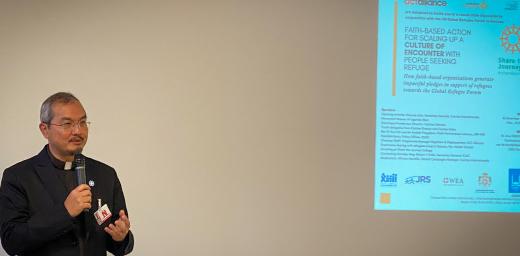UN Special Rapporteur seeks faith-based support for human rights’ advocacy

The Evangelical Lutheran Church in Hungary supports Roma families such as Eva's (holding her child) with shelter and advocates for their rights. Photo: Tamás Kiss
LWF’s Oral Statement on Roma People at Human Rights Council
(LWI) – The United Nations Special Rapporteur on Minority Issues Ms Rita Izsak encouraged The Lutheran World Federation (LWF) and other faith-based organizations to put more effort in articulating values that emphasize “love and care for the other,” regardless of people’s origin or background.
Responding to an LWF Oral Statement to the UN Human Rights Council (UNHRC) on Roma’s human rights, Izsak expressed concern that a lot of nationalist and populist parties claiming to be Christians today are also using “racist rhetoric against Roma and inciting hatred.” In addition to the Christians, many Roma Muslims migrating to Western Europe encounter discrimination based on both their ethnicity and religion, she said.
“I encourage all Christian organizations and others to reach out to these parties and again revisit our values such as love for one another regardless of our background or origin,” Izsak stressed. The report of the special rapporteur on 16 June focused on the “Human Rights Situation of Roma Worldwide.”
Dr Ojot M. Ojulu, LWF advocacy officer at the Office for International Affairs and Human Rights presented LWF’s statement, and commended the Special Rapporteur’s relentless efforts in promoting the rights of minority groups. Her report included findings from various regions with a focus on the discrimination and marginalisation faced by Roma people.
“The report reinforces LWF’s advocacy in collaboration with its ecumenical partners and emboldens us to do more,” Ojulu said.
In his contribution, Ojulu mentioned a broad-based consultation on migration and equal citizenship for Roma in Europe organized jointly by the LWF and the Churches’ Commission for Migrants in Europe in Frankfurt, Germany, in 2013. “A call for Justice and Dignity for Roma People,” the final document from the conference, included 12 recommendations, which among other actions, urged churches to enhance knowledge about Roma culture and history in church and society. Churches were also encouraged to use the International Holocaust Remembrance Day (27 January) and International Roma Day (8 April) to make Roma history and culture more visible and known.
The Special Rapporteur’s report highlighted the need to protect the existence of the Roma people and their identity and prevent violence against them. It also underlined protection and promotion of the Roma’s guarantee to non-discrimination, equality, and effective participation in public life.
In the report’s recommendations, Izsak stressed the role of States and other relevant stakeholders in ensuring effective and prompt investigation of any crimes against Roma individuals and communities. She noted that measures are required to monitor hate speech and incitement to violence against Roma people, in addition to raising awareness among the non-Roma populations.
Ojot expressed LWF’s commitment to disseminating the Special Rapporteur’s report within the communion’s networks and churches for further discussion. “We will encourage our member churches to lobby their respective governments on the report’s recommendations,” he added.
The 29th session of the HRC in Geneva continues until 3 July.





